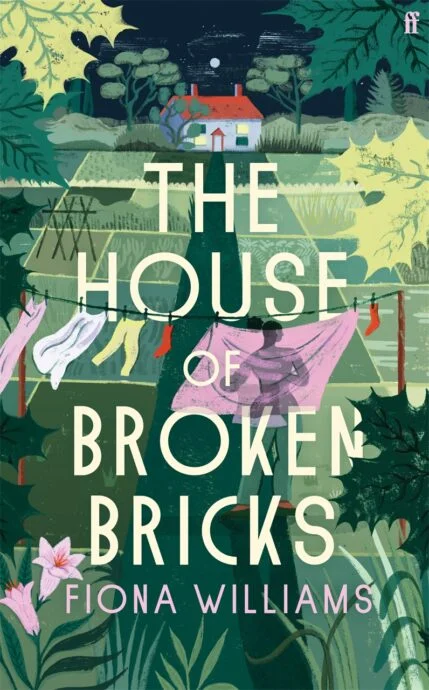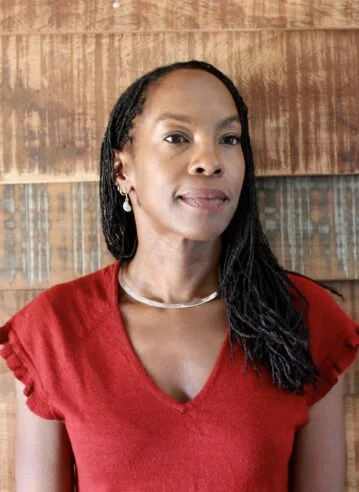
Fiona Williams is a second year PhD in Creative Writing. Her debut novel The House of Broken Bricks was published by Faber in January 2024. Here she talks to Ruth Moore about her project and her experiences as a debut novelist.
Hi Fiona! Can you tell us about the research component of your PhD project?
I am looking at multicultural retellings of traditional British folk tales, and how they have been influenced by social and political change and can be used to shape national perspectives of identity. I’m also looking at the current folk tale renaissance in the UK, because it’s huge, not just in literature, but also in theatre and art. I’m looking particularly at short fiction and the publishing landscape for contemporary folk literature.
And your creative work?
My creative piece is a novel that has short stories captured within it. It will explore folklore, identity and connections to place, life in the margins and accessing marginal spaces.
What drew you to doing a PhD in Creative Writing in the first place?
I think it was a case of feeling untethered after my MA – I loved the structure of a course, having feedback and peers to bounce ideas off. I never thought I’d be doing a PhD but now I’m here I’m very, very pleased. Deadlines really help me creatively, as does having supervisors to keep me on track. Other PhD students are a different sort of support network that you can’t get from friends and family, and you can’t necessarily get if you join a writing group. Everyone understands what you’re going through. And I love being on campus. I love that feeling of belonging.
I’m interested how you’re finding being a ‘professional’ artist in your discipline, as well working on your PhD. How did your debut novel come about?
The debut novel came out of my MA; I think it would never have happened otherwise. Life would have gotten the way, and it would have been one of those things that I kept meaning to do, but never got round to. It all happened really quickly. I was so focused on experimenting with my own writing that I didn’t have any expectations for what would come afterwards. I had never written a novel before or anything even remotely that length.
What is at the heart of the novel?
For me, it’s ultimately a love story; how love can come through in very different ways at different times in a family’s life cycle. It looks at love for landscape, nature and place, as well as for family and community members; how support and tenderness can come from unexpected sources. I also wanted to explore questions around our perceptions of identity and race, those perceptions that we have of ourselves versus the those that other people have of us.
What has your experience of publication been like?
For me, The House of Broken Bricks is finished; I’m ready to put it behind me. But being caught in the publication process means I’m still having to think and talk about it all the time. It still occupies a large part of my brain, which is a bit of a challenge, as I ‘m ready to be completely focused on my PhD and next novel. But on the flip side of that, it’s been helpful having the PhD running alongside because the publication journey is really surreal. You can get completely swept up in this euphoria when the book is first launched, but it’s over quite quickly and you’re soon dropped back down to earth. A lot of debut writers talk about this fall off the edge, at the end of publicising their first book, they’re suddenly really empty and they’re sat there going, oh God, now I’ve got to write something else! Whereas for me, the PhD is helping me to frame my next novel and to shape my career as a writer going forwards.
I am really fascinated by the range of points at which people have come to the PhD; how that runs alongside their hopes for a writing life. It doesn’t seem like there’s one best way of doing it. There was a real pinch point for you this year, but the PhD is, if I’m hearing you right, giving you a momentum onwards out of your debut?
It is. It really helps with establishing yourself as a writer. I still don’t feel comfortable calling myself a writer because I still feel very much in the experimental phase. With the PhD, it gives you a bit of shelter and more mental security than being on your own out there. I know I’ve got people I can share my work with who are supportive of me, and not from a monetary perspective, which is really different from how the publishing industry works.
You’ve taught undergraduate creative writing this year – what has that added to your PhD experience?
I taught on the Building a Story module, which looks at the construction and purpose of short stories. I have to admit, I was terrified at the start because I hadn’t done any teaching before and it definitely took me a week or two to warm up to the whole experience. But I found it so rewarding. Teaching has helped to give me confidence and the belief that I do have something to say, with authority. Writing can be really exposing, and it was really heartwarming to watch the students develop over the weeks, and to feel the trust grow between me and them, and between themselves as a class. In terms of the PhD, it does give you more strands to pull on. There are lots of things that being a writer can mean and having teaching experience and thinking about a future in academia was something that I had never considered before. I’ve found that it’s a useful thing to help others shape their ideas, because through teaching them ways to approach their writing, you are reminded of how you too can approach your own work.
Find Fiona’s debut novel here and find out more about Fiona’s journey here
____________________________________________________________________________________

Fiona Williams holds a BSc (Hons) in Biological Sciences from the University of Westminster and an MA with Distinction in Creative Writing from Bath Spa University. She is the winner of the 2021 Bridport Prize, Peggy Chapman-Andrews First Novel Award. Originally from South-East London, she now lives with her family on the Somerset Levels. She is currently completing a PhD in Creative Writing at the University of Exeter.
